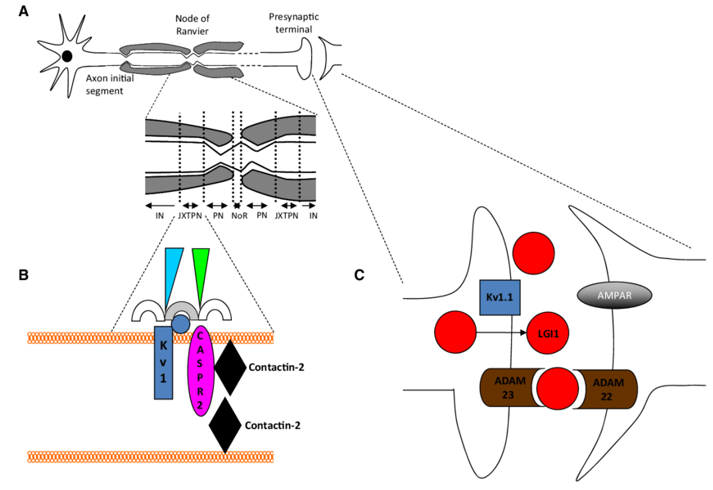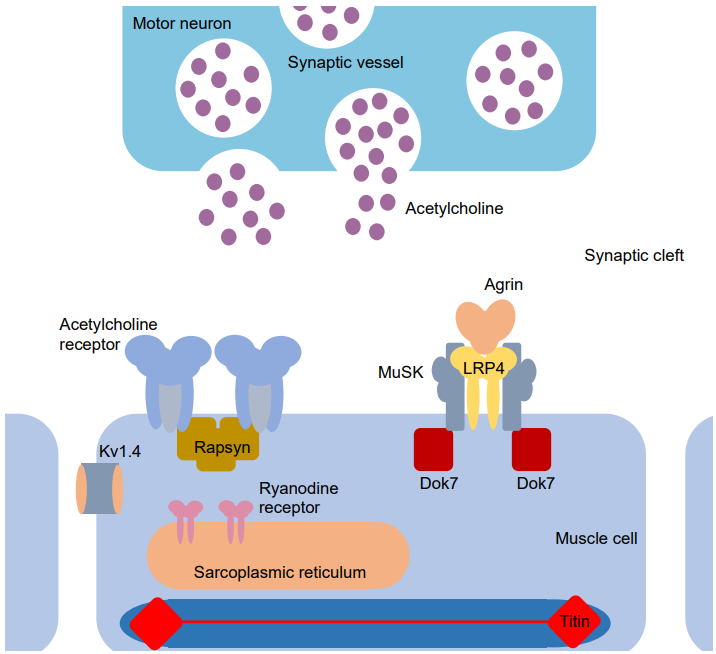NAA Services for Anti-VGKC (Kv1.4)
With increasing interest in the possible etiologic or protective role of natural autoantibodies (NAA) in diseases, and the recognition that early diagnosis and immunotherapy treatment improves outcome in NAA-associated diseases, it is important for researchers to be able to make informed decisions regarding which patients to test and whether the results will affect patient management and disease outcome. At present, Creative Biolabs is able to provide a full range of anti-VGKC (Kv1.4) marker services based on our advanced and innovative NAA platform.
Background of Anti-VGKC (Kv1.4) Antibody
Voltage-gated potassium channels (VGKCs) are present on the membrane of neurons in both the central and peripheral nervous system. VGCKs play a crucial role in returning the cell to the resting state after an action potential. Antibodies directed against components of the VGKCs complex are associated with several clinical syndromes, including limbic encephalitis, focal epilepsy, myasthenia gravis (MG) and neuromyotonia.
 Fig.1 Illustration of the VGKC complexes. (Varley, 2015)
Fig.1 Illustration of the VGKC complexes. (Varley, 2015)
The Role of Anti-VGKC (Kv1.4) Antibody in Myasthenia Gravis (MG)
MG is an autoimmune neurological disorder disease of the neuromuscular junction (NMJ) characterized by fatigability and weakness of striated muscles. Patients with thymoma-associated MG (MG-T) produce autoantibodies to a variety of neuromuscular antigens including the AChR, MuSK, LRP4, RyR. In many MG cases, anti-VGKC antibodies are also present as well as antibodies to the mentioned four targets. Cell-based assays are the most commonly used approaches for the detection of those antibodies directed to components of the VGKC complex in MG.
 Fig.2 The NMJ and the proteins involved in neuromuscular transmission.2
Fig.2 The NMJ and the proteins involved in neuromuscular transmission.2
The Role of Anti-VGKC (Kv1.4) Antibody in NAA Associated Epilepsy
Epilepsy is a common neurologic disorder showing resistance to antiepileptic drugs (AEDs) in at least 25-30% of the cases, and its etiology is still unknown. A variety of serum antibodies to specific neuronal proteins including VGKC complex has recently been identified in ordinary patients with epilepsy. Studies indicated a VGKC complex autoimmunity-related subgroup in the syndrome of mesial temporal lobe epilepsy with hippocampal sclerosis (MTLE-HS). VGKC complex antibodies were also reported in association with drug-resistant focal epilepsy. These autoantibodies could be the markers of currently unknown immunopathologic processes.
What We Can Do about NAA?
Equipped with our well-established platforms and experienced scientists, we can provide comprehensive NAA services, from NAA detection, NAA profiling, to NAA epitope mapping. A wide spectrum of NAA products is available for your choice.
Features of Our Services
- Seasoned technology and professional scientists
- One-stop pipeline to save your valuable time
- High efficiency and accuracy
- Best after-sale service
Creative Biolabs is capable to provide NAA products and services about different autoantigens. Our advanced and optimized platforms can help you quickly get satisfactory results without repeated trials. We also provide our worldwide customer services based on the requirements of the clients to meet the specific demand. Please contact us for more information.
References
- Varley, James, Angela Vincent, and Sarosh R. Irani. "Clinical and experimental studies of potentially pathogenic brain-directed autoantibodies: current knowledge and future directions." Journal of neurology 262 (2015): 1081-1095.
- Keller, Christian W., et al. "Fc-receptor targeted therapies for the treatment of myasthenia gravis." International Journal of Molecular Sciences 22.11 (2021): 5755.
Related Services:
- NAA Services for Anti-Acetylcholine Receptor (AChR)
- NAA Services for Anti-Muscle-specific Tyrosine Kinase (MuSK)
- NAA Services for Anti-Lipoprotein-related Protein Receptor 4 (LRP4)
- NAA Services for Anti-Ryanodine Receptor (RyR)
- NAA Services for Anti-Titin Antibody
- NAA Services for Anti-Interferon-α and Interleukin
- NAA Services for Anti-Myofibrillar Proteins

